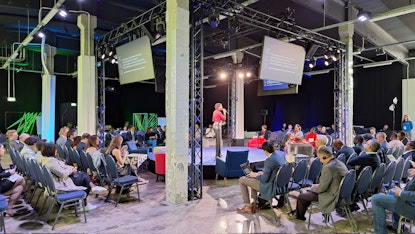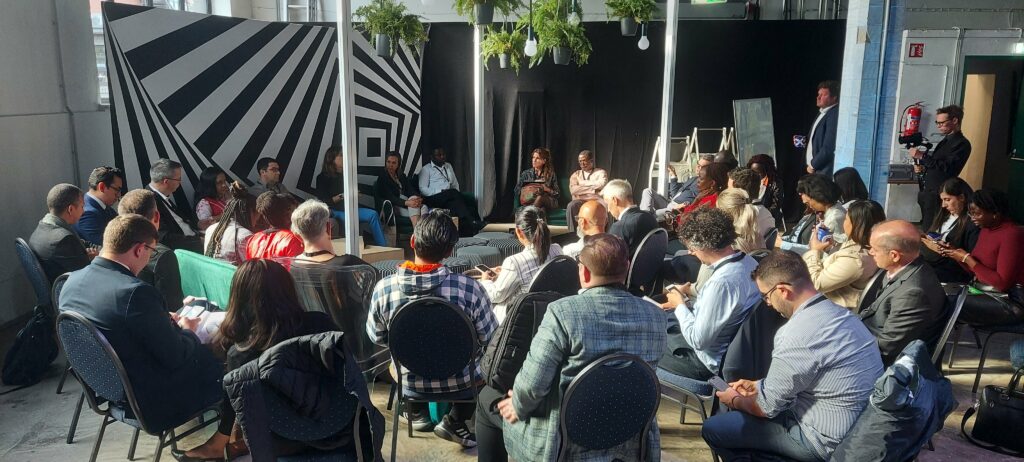Commitment, coalitions, change: How we can build on #OGPEstonia’s energy to reform public contracting

In my line of work, nothing quite beats hearing stories of reform and impact by the people who led the changes in real life. At #OGPEstonia, we had the pleasure of hosting about 200 frontline reformers sharing their experiences, challenges, and successes in boosting inclusion, integrity, participation, and digital transformation in public procurement.
I’ll try to capture the highlights for our global network and reflect on how we can convert this momentum into stronger OGP National Action Plan implementation in future.
This is what our #opencontracting rockstars highlighted:
Erika Kurockina, Vice Minister of Economy in Lithuania who highlighted the role of open data and digital tools – as well as old-fashioned relentless outreach and engagement – in Lithuania’s drive to use green criteria for 100% of their procurement by the end of the year.
Oscar Escobar who is the mayor of the City of Palmira, Colombia, one of the poorest cities in the country and right in the middle of the past civil war. “I am a politician, I am normally one of the bad guys,” he said as he explained how fixing public procurement was one of the most powerful levers his city administration had for economic inclusion and opportunity, especially for women-owned businesses and agricultural collectives. The city increased its spend on school meals with local women-led suppliers from zero to 30%. You can read the whole inspiring story here.
Mariana Campos from Mexico Evalua shared her journey in opening up infrastructure contracts in Mexico. She emphasised the importance of building coalitions between government, civil society and business, using data to drive change & gradually building momentum to achieve tangible results. Another great story on that here.
Charlene Migwe-Kagume from Development Gateway focused on how to make notoriously clunky e-GP systems more user-friendly and streamline workflows digitally as opposed to taking inefficient paper-based systems online. She warned that unless we design for data and information usage right from the start, we won’t get it. Here’s how Development Gateway developed better tech for Makueni County in Kenya and the early results.
Einer Fogh from GIZ Uganda discussed the power of strategic monitoring partnerships marrying civil society and government to track outcomes from procurement spending. A lot of trust building and engagement is needed to get everybody on the same page at the start but once the procurement authority buys into how civil society can extend their reach and improve project tracking, it can be a virtuous circle. In Uganda, they are using simple, phone-based tools, now with about 1000 monitors and 200 issues raised for review. The innovation is not in the system itself, he told us, but in the insight on how this helps procurement authority do their job better.

We now have plenty of evidence that radical change is possible in procurement, so how can we make OGP’s many open contracting commitments consistently convert into stronger results? That was my focus at the OGP’s High Level Panel on Progress Against Corruption.
We need to:
1) Convert general do-gooding commitments into clear goals and change management. Changing public procurement is hard as there are a lot of stakeholders to engage and a lot of vested interests that benefit for the status quo so it is really important to narrow down general transparency commitments to a specific problem you want to solve. You need to plan for systematic change management right from the start and anticipate how you will handle pushback. A strong OGP commitment still needs to result in a detailed plan with a timeline, adequate resources and political will to drive change.
2) Build stronger coalitions and countervailing power. We need to build coalitions of change with the power to overcome vested interests, inertia and protect progress. That means working across both businesses and civil society to engage new voices and actors like small businesses who are shut out from government contracts by the cronies, and creating opportunities for communities who want a say in their services.
3) Leverage data and digitization. Public procurement involves millions of transactions. We need to think digitally, leveraging machine-readable open data to follow the money across the entire flow of planning, procurement and implementing contracts and then act on the data to power up goal-driven strategic reforms that boost competition and fairness.
The upcoming UN Convention against Corruption (UNCAC) Conference of State’s Parties in Atlanta in December provides the perfect opportunity for the OGP community to put these insights to work.
As OCP, we are thrilled that the Government of France will table the first ever dedicated UNCAC resolution on public procurement with data, digitization and civic participation as core priorities. We’re calling upon open government reformers everywhere to step up and show their support!